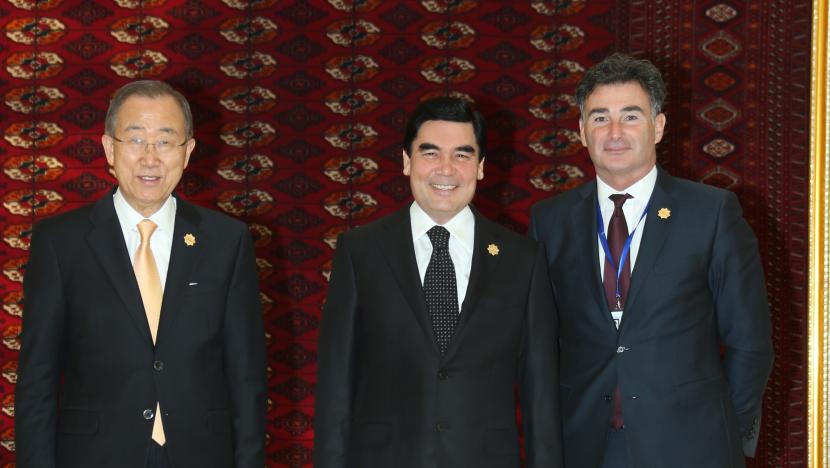Offering fresh thinking on transport infrastructure, financing, sustainable transit corridors and the digitalisation of logistics, the Ashgabat Transport Business Summit called on the transport industry to act, working in partnership across the public and private sectors, to develop new technology and new innovations to achieve the UN Sustainable Development Goals (SDGs).
Co-organised by the Government of Turkmenistan and IRU-led Global Partnership for Sustainable Transport® (GPST®), the Summit brought together representatives of global transport companies, governments, international development agencies and banks. Participants considered the future of sustainable transport within the context of public-private-partnerships.
The President of Turkmenistan, H.E. Gurbanguly Berdimuhamedov, underscored his government’s commitment to sustainable transport. He referred to numerous initiatives led by Turkmenistan, notably the adoption of two resolutions on sustainable trade and transit corridors and its hosting of the first UN Global Sustainable Transport Conference.
IRU Secretary General Umberto de Pretto, cited the 3i Strategy that focuses on incentives, innovation and infrastructure to achieve the SDGs, setting the stage for several companies to demonstrate exemplary projects.
EagleRail Chief Marketing Officer, Mike Wychocki, showcased the overhead suspended monorail for improved container logistics management; Dan Dorsch of the MIT Hyperloop revealed a high-speed mobility concept; ECO SLC Chairman, Herman Journée, demonstrated how communications technology can help with the complexities of global sustainable logistics management; and Yushi Torigoe of the International Telecommunications Union, asserted that the future of transport will be driven by the Internet of Things (IoT), a concept that predicts that almost twenty-four billion devices by 2020 will introduce greater efficiency into our daily routines.
Dr. Mahmoud Moheildin, the World Bank Group’s Senior Vice President for the 2030 Development Agenda, UN Relations, and Partnerships issued a clear and detailed call for more innovative forms of financing for sustainable transport, such as blended finance and leveraged finance. Both involve investments by governments and the private sector, to address financing gaps for more sustainable transport systems.
Gyan Chandra Acharya, United Nations Under Secretary General and High Representative for the Least Developed Countries, Landlocked Developing Countries and Small Island Developing States (UN-OHRLLS) underscored the importance of private sector engagement to help landlocked developing countries become ‘landlinked’ to the global economy.
The importance of road safety was highlighted by United Nations Special Envoy, Jean Todt, who called on international development partners to mobilise similar levels of support for road safety to reduce accidents and deaths, as has happened in the fight against Aids and Malaria.
The Summit has resulted in the adoption of the Ashgabat Transport Business Summit Declaration, which was endorsed in the UN Global Sustainable Transport Conference outcome document, the Ashgabat Statement on Commitments and Policy Recommendations.

